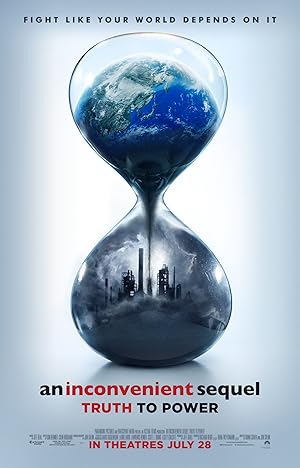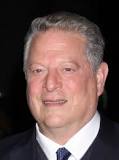
An Inconvenient Sequel: Truth to Power Page #2
that we've got to act
on the climate crisis.
But it's not happening
fast enough.
If I said
there weren't times when
I felt this was
a personal failure on my part,
I'd be lying.
So where
is all that water going?
I'll tell you
where some of it's going.
It's going into the streets
of Miami Beach, Florida.
High tides continue
to bring a flood of frustration.
Fort Lauderdale gets the award
for the "something you don't
see every day" video.
Fish swimming on Cordova Road.
Experts say in 30 years or so,
a drive along Ocean Drive
could be a drive in the ocean.
Downtown Miami could be awash.
We're showing you
an area that hasn't been
actually fixed at all,
as you can tell.
And then, on Wednesday,
we're gonna show you
some of the areas
that used to be like this,
but now we raised the road
and put in pumps.
We've seen dramatic results.
It's so much better.
So you raised the road with
saltwater-resistant materials?
Yes.
And what level of sea level rise
is this designed
to protect against?
We are building in about
a foot of sea level rise.
And I'm sure the projections
are gonna continue to move.
Kinda hard to pump the ocean.
That's why
we've got to raise above it.
- Yeah.
- Yeah.
Yeah, it's not easy.
It's not easy.
This is not a simple fix.
- Yeah.
- Yeah.
You can only raise so much
before you change
everybody's lives around here.
Yeah.
Scott and I grew up here.
This wasn't the case
40 years ago.
So if anyone wants to argue
that it's not happening...
It's happening.
It's happening.
It's coming out of the manholes,
coming out of the drains.
And this is while the pumps
are operating at full capacity.
This is a stopgap measure
at best.
Look, it's coming out
into the street there.
Well, I've got to go onstage
in about 15 minutes.
- So...
- Right.
Show me where
the new slides are,
and then try to
fix these videos.
Put them on a stick,
and I'll try
to download them to my computer.
Okay.
I thought those boots
were gonna be high enough,
but they weren't.
All right.
Thank you. Thank you.
Thank you very much.
I am so excited to be here
and so excited
that you are here
for this training.
I'm a little bit late
getting here
because I got up early
and put on some wading boots
and went over to
a couple of the streets
that are filled up
with water this morning.
Miami, in terms of
assets at risk,
is the number one city at risk
in the entire world
for sea level rise.
This is a major crisis.
Projected sea level rise
in South Florida,
possibly seven feet
or more in this century.
By population,
the top ten cities at risk:
Kolkata, Mumbai, Dhaka,
Guangzhou, China, et cetera.
West Africa.
A lot of people at risk there.
And, of course,
the low-lying islands,
the Maldives have an enormous
amount at risk.
Kiribati has
already purchased land
to move its entire population.
And again, this is from
the city we're in right now.
I mean, I just wonder
how the governor
sloshes through this and says,
"I don't notice anything.
Do you notice anything?"
So, Florida...
- Florida.
- ...is a challenge, and so...
- I can confirm that.
- Okay.
So, that's the big question
we have.
I cover the climate,
environmental stuff
all the time,
and you have a state
with a governor
who wouldn't even
meet with scientists
- to talk about climate change.
- Yeah.
How do you move forward on it?
In order to address
the environmental crisis,
we are gonna have to
spend some time
fixing the democracy crisis.
Because big money
has so much influence now,
our democracy has been hacked.
Large contributors
call the shots.
Have you ever thought about
running for office again?
I've used this line before,
so forgive me,
but I am
a recovering politician.
And the longer I go
without a relapse,
the less likely one becomes.
So, I just wanted to say,
we'll probably do, sort of,
three buckets of stuff.
- All right.
- So, there's...
- Is one of them climate?
- Yes, climate.
Yes. One of them is climate,
one of them is sort of
broadly like how politics
are different now
than they were,
- say, 15 years ago.
- Sure.
Citizens United...
I'm interested to hear
your thoughts on that.
- Okay, yeah.
- And then some 2016 stuff.
Okay. But I'm not gonna...
You can decline.
I know you're not gonna...
I'm not gonna commit news.
Yes, I know.
But I'll try to get you to.
Okay.
But we will talk about climate?
Yeah, yeah, yeah!
I got to feed the beast,
Mr. Vice President.
Sometimes it seems to me that
the climate crisis is simply
not getting the kind of
coverage in the media
that it should.
You have a
Republican Party right now...
Historically large field, right?
There's no one on climate...
Yeah, it's odd, isn't it?
...in the entire lineup.
Since when did the United States
abandon its traditional
world leadership role?
Especially at a time when,
just this past week,
"Okay, we're going to adopt
a cap and trade program,"
"and we're reducing
our CO2 emissions,"
"and we want to create jobs"
"in solar and wind
and efficiency."
This is the most serious
global challenge
we've ever faced.
No other country
can play the role
that the U.S. can play.
Do you think that we're reaching
that tipping point
to the point that
it's not going to be
any more denial?
We are at a turning point.
And we can successfully
reach an agreement
in this big global negotiation
in Paris
at the end of November
to have a real meaningful turn
in the right direction.
At what moment did you decide
that you wanted to leave
politics aside and actually
move into this, uh,
new career that you have?
Well, to be honest,
that decision was one made
by the Supreme Court
of the United States.
I enjoyed politics,
but this is a mission
that I have dedicated myself to.
And there's a hunger
for information
about what's happening,
why it's happening,
and how we can fix it.
I usually start
with a black screen.
And, trust me,
after only
two or three times through,
you will associate your own
way of telling each story
with the picture,
and it'll come so easily.
The way the memory works...
Ten years ago,
I made the decision
so that anyone
who wanted to learn
the skills to communicate
to thousands of others
could come and get trained.
...'cause really,
all we're trying to do
is get the first stage going,
which is just waking people up.
There were only 50
of them in the beginning.
But I look back
on that first training
and it makes me smile,
because they were real pioneers,
in my way of thinking about it.
This is the first picture
that any of us ever saw
of the Earth from space.
It was taken
on Christmas Eve, 1968,
during the Apollo 8 mission.
And this was the first time
that human beings
left near-Earth orbit
and went far enough into space
to see the planet whole,
floating in the void.
Translation
Translate and read this script in other languages:
Select another language:
- - Select -
- 简体中文 (Chinese - Simplified)
- 繁體中文 (Chinese - Traditional)
- Español (Spanish)
- Esperanto (Esperanto)
- 日本語 (Japanese)
- Português (Portuguese)
- Deutsch (German)
- العربية (Arabic)
- Français (French)
- Русский (Russian)
- ಕನ್ನಡ (Kannada)
- 한국어 (Korean)
- עברית (Hebrew)
- Gaeilge (Irish)
- Українська (Ukrainian)
- اردو (Urdu)
- Magyar (Hungarian)
- मानक हिन्दी (Hindi)
- Indonesia (Indonesian)
- Italiano (Italian)
- தமிழ் (Tamil)
- Türkçe (Turkish)
- తెలుగు (Telugu)
- ภาษาไทย (Thai)
- Tiếng Việt (Vietnamese)
- Čeština (Czech)
- Polski (Polish)
- Bahasa Indonesia (Indonesian)
- Românește (Romanian)
- Nederlands (Dutch)
- Ελληνικά (Greek)
- Latinum (Latin)
- Svenska (Swedish)
- Dansk (Danish)
- Suomi (Finnish)
- فارسی (Persian)
- ייִדיש (Yiddish)
- հայերեն (Armenian)
- Norsk (Norwegian)
- English (English)
Citation
Use the citation below to add this screenplay to your bibliography:
Style:MLAChicagoAPA
"An Inconvenient Sequel: Truth to Power" Scripts.com. STANDS4 LLC, 2025. Web. 21 Feb. 2025. <https://www.scripts.com/script/an_inconvenient_sequel:_truth_to_power_2786>.







Discuss this script with the community:
Report Comment
We're doing our best to make sure our content is useful, accurate and safe.
If by any chance you spot an inappropriate comment while navigating through our website please use this form to let us know, and we'll take care of it shortly.
Attachment
You need to be logged in to favorite.
Log In